Ash Ranges
QARANC officers on exercise with RAMC Medics at Ash Ranges. This Soldier Magazine cover, from 6 to 19 September 1982, states, QAs into battle.
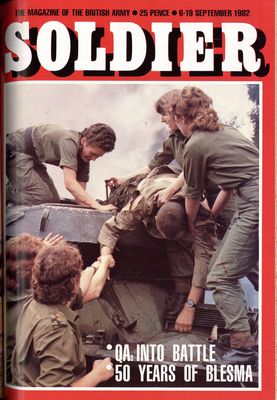
It reads:
The Army's newest officer nurses test their skills and themselves in front line battle action.
Angels get a glimpse of hell.
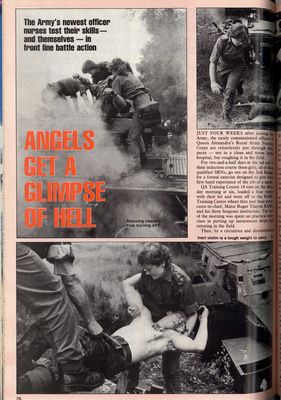
Just four weeks after joining the Army, the newly commissioned officers of Queen Alexandra's Royal Army Nursing Corps are relentlessly put through the paces, not in a clean and warm Army hospital, but roughing it in the field.
For two-and-a-half days at the tail end of their induction course these girls, all of them qualified SRN's, go out on the Ash Ranges for a formal exercise designed to give them first hand experience of the job of a medic.
QA Training Course 14 rose on the Monday morning at six, loaded a four tonner with their kit and went off to the RAMC Training Centre where they met their Persecutor-in-chief, Major Roger Thayne RAMC and his three Sergeant instructors. The rest of the morning was spent in practical exercises in putting up intravenous drips and suturing in the field. Then by a circuitous and disorientating route, they were taken out onto the Ranges where they put up all their tentage with accompanying camouflage and dug their latrines.
"I want you to dig a hole three feet deep by two foot long and 18 inches wide," explained captain Bridget McEvilly, the QA training officer. Twenty minutes later she found a trench three feet wide and 18 inches deep!
"We knew 'three foot' came into it somewhere," said the girls when they realised their mistake and wondered how they would straddle a three foot grave!
After their first meal of compo which they found "constipating, but really not that bad" this intrepid bunch faced their first gruelling exercise under war conditions. This meant running up the aptly named "heartbreak hill" in full NBC kit, collecting a casualty hidden by green "gas" and bringing him downhill again on a stretcher.
This proved by far the hardest part of the whole exercise and in spite of regular PT over the previous four weeks the girls felt the strain. One of them, Lieutenant Alison Hughes, fell heavily on the way down with the stretcher and injured her knee. "But it was for real," said Alison. "Even though I was in agony with my knee, I had to wait the full half hour decontamination period in all my kit before they'd look at my knee."
Sadly, her injury meant that Alison was put out of action and had to retire from the exercise. SOLDIER asked her if she felt just a bit relieved, but not a bit of it: "After you've been together for five weeks and such a close course too, it's terrible to have to just sit and watch.
Up at five the following morning a two mile run was the first item on the agenda followed by an assault course that any soldier would have been proud to complete. And all before breakfast. Instruction and revision in making weapons safe and first aid followed in preparation for the afternoon's casualty exercise.
Imaginatively stagemanaged by Major Thayne, the exercise's two scenarios left the girls in no doubt as to their 'reality'. Broken and gory 'bodies' lay hideously draped over and around burning vehicles which had just come under air attack.
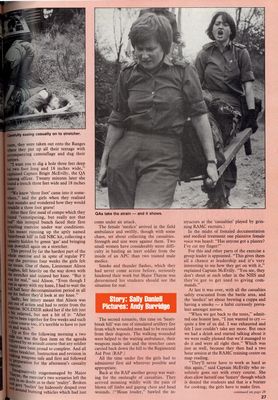
The female 'medics' arrived in the field ambulance and swiftly, though with some chaos, set about collecting the casualties. Strength and size were against them. Two small women have considerably more difficulty in hauling an inert soldier from the inside of an APC than two trained male medics.
Smoke and Thunder flashes, which they had never come across before, seriously hindered their work before Major Thayne was determined his students should see the situation for real.
The second scenario, this time on 'heartbreak hill' was one of simulated artillery fire from which wounded men had to be rescued from their dugouts The walking wounded were helped to the waiting ambulance, their weapons made safe and the stretcher cases carried back down the hill to the Regimental Aid Post (RAP).
All the time under fire the girls had to administer first aid wherever possible and appropriate.
Back at the RAP another group was waiting for the onslaught of casualties. They arrived moaning wildly with the pain of blown off limbs and gaping chest and head wounds. ("Moan louder," bawled the instructors at the 'casualties' played by grinning RAMC recruits.)
In the midst of frenzied documentation and medical aid one plaintive female voice was heard: "Has anyone got a plaster? I've cut my finger!"
For this and other parts of the exercise a group leader is appointed. This gives them all a chance at leadership and it's very interesting to see how they get on with it." explained Captain McEvilly. "You see, they don't shout at each other in the NHS and they've got to get used to giving commands."
At last it was over, with all the casualties safely evacuated from the battle area, and the 'medics' set about brewing a cuppa and having a smoke, a habit curiously prevalent amongst nurses.
"When we got back to the tents," admitted one honest lass, "I just wanted to cry, quite a few of us did. I was exhausted and felt I just couldn't take any more. But once we had a drink and started talking about it we were really pleased that we've managed to do it and we're all right then." Which was just as well, because they then had a two hour session at the RAMC training centre on map reading.
"They'll never have to work as hard as this again." said Captain McEvilly who resolutely goes out with every course. She does allow herself one 'luxury' though which is denied the students and that is a burner for cooking; the girls have to make fires.
"They learn a lot about themselves out here and their level of endurance. Most of them don't believe they could ever do the things they actually do. If I'd told them exactly what to expect they'd be horrified. But faced with the situation they just get on with it."
Badly in need of rest and some levity, the girls could relax from nine o'clock on the second night and enjoy the 'barbecue'; sausages, onions, steak, a mean red sauce and, incongruously, chow mein, all served sumptuously on paper plates.
Traditionally during this evening the QAs give their own special tribute to their instructors in the form of a floor show. Raising the canvas roof of the 'eighteen by twenty-four' Course 14's effort made the London Palladium look tame. Naturally the instructors were the butts of the good-humoured jokes with Captain McEvilly ('a real ring-dinger! Good-looking, so divine') and Major Thayne bearing the brunt.
Excused guard duty for the night the valiant nurses fell into exhausted sleep, gathering their strength for the final hurdle, a five mile map reading exercise. At nine the next morning, tentage down and no visible signs of occupation, the RAMC Sergeant instructors set off with their 'men' clutching maps and magnetic compasses.
The instructors, used to their own raw recruits, say the QAs almost always put their all into this field exercise. Sergeant Danny Sweeney for instance, who has taken several groups of QAs out over the last year reckoned: "we get far more out of them than the lads, they really worked one hundred percent."
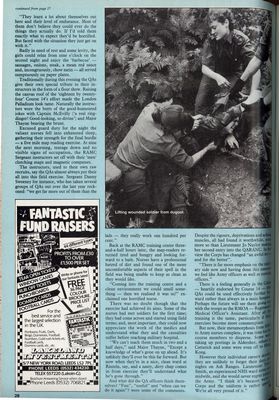
Back at the RAMC training centre three-and-a-half hours later, the map-readers returned tired and hungry and looking forward to a bath. Nurses have a professional hatred of dirt and found one of the more uncomfortable aspects of their spell in the field was being unable to keep as clean as they would like.
"Coming into the training centre on a clean environment we could smell something, then we realised it was us! exclaimed one horrified nurse.
There was no doubt though that the exercise had achieved its aims. Some of the nurses had met soldiers for the first time; they had come across and started using field terms; and, most important, they could now appreciate the work of the medics and understand what they and the casualties suffer before reaching military hospital.
"We can't teach them much in two and a half days," said Major Thayne, "Except a knowledge of what's gone on up ahead. It's unlikely they'll ever be this far forward. But now when they're in a nice clean ward at Rinteln, say, and a nasty, dirty chap comes in from exercise, they'll understand what he's gone through."
And what did the QA officers think themselves? "Fun", "useful" and "when can we do it again?" were some of the comments.
Despite the rigours, deprivations and aching muscles, all had found it worthwhile, none more so than Lieutenant Jo Naylor making her second entry into QARANC. In her view the Corps had changed an "awful lot, and for the better".
"There is far more emphasis on the military side now and having done this exercise we feel like Army officers as well as nursing officers."
There is a feeling generally in the Corps, heartily endorsed by Course 14, that QAs could be used effectively further forward than always in a main hospital. Perhaps the future will see them going out with the troops as the RMOA, Regimental Medical Officers Assistant. After all the training is the same, particularly if field exercises become more commonplace.
But now, their metamorphosis from NHS to Army nurses complete, it was time for the course members to disperse. Some were taking up postings in Aldershot, others in Catterick and some were even off to Hong Kong.
However their individual careers develop they are unlikely to forget their days and nights on Ash Ranges. Lieutenant Trisha Smith, an experienced NHS ward sister and midwife, said she would never regret joining the Army. "I think it's because we're a Corps and the uniform is rather special. We're all very proud of it."
With thanks to Terry Hissey for providing this fascinating article from SOLDIER Magazine.
Follow us on Facebook, Instagram and Twitter.

My PTSD assistance dog, Lynne, and I have written a book about how she helps me with my military Post Traumatic Stress Disorder, anxiety, and depression. I talk about my time in the QAs and the coping strategies I now use to be in my best health.
Along the way, I have had help from various military charities, such as Help for Heroes and The Not Forgotten Association and royalties from this book will go to them and other charities like Bravehound, who paired me with my four-legged best friend.
I talk openly about the death of my son by suicide and the help I got from psychotherapy and counselling and grief charities like The Compassionate Friends.
The author, Damien Lewis, said of Lynne:
"A powerful account of what one dog means to one man on his road to recovery. Both heart-warming and life-affirming. Bravo Chris and Lynne. Bravo Bravehound."
Download.
Buy the Paperback.

This beautiful QARANC Poppy Pin Badge is available from the Royal British Legion Poppy Shop.
For those searching military records, for information on a former nurse of the QAIMNS, QARANC, Royal Red Cross, VAD and other nursing organisations or other military Corps and Regiments, please try Genes Reunited where you can search for ancestors from military records, census, birth, marriages and death certificates as well as over 673 million family trees. At GenesReunited it is free to build your family tree online and is one of the quickest and easiest ways to discover your family history and accessing army service records.
More Information.
Another genealogy website which gives you access to military records and allows you to build a family tree is Find My Past which has a free trial.

Former Royal Air Force Regiment Gunner Jason Harper witnesses a foreign jet fly over his Aberdeenshire home. It is spilling a strange yellow smoke. Minutes later, his wife, Pippa, telephones him, shouting that she needs him. They then get cut off. He sets straight out, unprepared for the nightmare that unfolds during his journey. Everyone seems to want to kill him.
Along the way, he pairs up with fellow survivor Imogen. But she enjoys killing the living dead far too much. Will she kill Jason in her blood thirst? Or will she hinder his journey through this zombie filled dystopian landscape to find his pregnant wife?
The Fence is the first in this series of post-apocalyptic military survival thrillers from the torturous mind of former British army nurse, now horror and science fiction novel writer, C.G. Buswell.
Download Now.
Buy the Paperback.
If you would like to contribute to this page, suggest changes or inclusions to this website or would like to send me a photograph then please e-mail me.
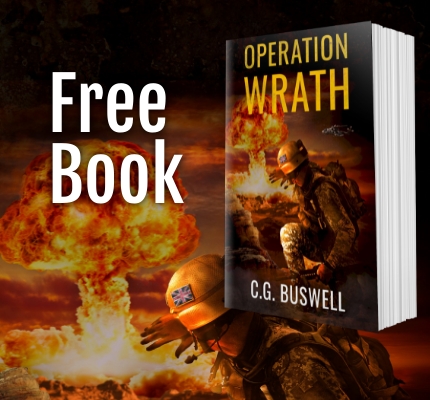
Free Book.
The death of the Brotherhood will be avenged.
RAF gunner Jason Harper and a team of Special Air Service operators are enraged after the death of their brothers by a terrorist drone strike. They fly into south-eastern Yemen on a Black-op mission to gather intelligence and avenge the death of their comrades.
Can they infiltrate the Al-Queda insurgents' camp, stay undetected, and call down their own drone missile strike and get home safely?
Will they all survive to fight another day?
Operation Wrath is a free, fast-paced adventure prequel to the non-stop action The Fence series by military veteran author C.G. Buswell.
Download for free on any device and read today.
This website is not affiliated or endorsed by The Queen Alexandra's Royal Army Nursing Corps (QARANC) or the Ministry of Defence.

